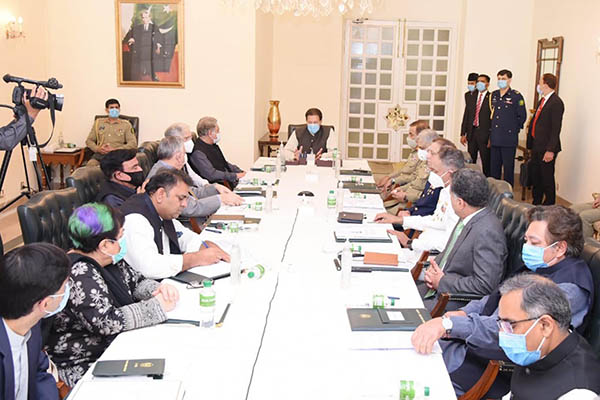
The NSC meeting in Islamabad. Courtesy PID
National Security Committee reiterates Pakistan’s commitment to inclusive political settlement representing all Afghan ethnic groups
A meeting of Pakistan’s National Security Committee on Monday called on “all parties” in Afghanistan to respect the rule of law, protect fundamental human rights of all citizens, and ensure that Afghan soil is not used by any terror outfit against any other country.
Convened by Prime Minister Imran Khan in the wake of the Taliban assuming complete control of Afghanistan—and the resignation and subsequent exit of former president Ashraf Ghani from the country—the NSC meeting noted “positively” that major violence had thus far been averted.
According to a statement issued after the meeting, it was attended by senior cabinet members and services chiefs. The participants were briefed on the latest developments in Afghanistan and their possible impact on Pakistan and the region, including the overall security situation.
Participants reiterated that Pakistan remains committed to an inclusive political settlement as the way forward representing all Afghan ethnic groups. It was reaffirmed that Pakistan would continue to work with the international community and all Afghan stakeholders to facilitate an inclusive political settlement in the country. It was stressed that the principle of non-interference in Afghanistan must be adhered to.
The NSC meeting stressed that there had been no change to Pakistan’s stance on there being no military solution to the Afghan conflict. It noted that the “ideal time” to end the U.S.-led war through negotiations would have been when a maximum number of foreign troops were deployed in Afghanistan, stressing that any continuation in the deployment of foreign troops would “not have yielded a different outcome.” It endorsed the administration of U.S. President Joe Biden for standing by the decision of former president Donald Trump to withdraw all troops from Afghanistan, describing it as a “logical conclusion” to the conflict.
“It is now time for the international community to work together to ensure an inclusive political settlement for long term peace, security and development of Afghanistan/the region,” read the statement. It recalled that Pakistan had been a victim of the decades-long conflict in its neighboring state, adding that it now desired peace and stability in its region. “It was emphasized that the world must recognize the sacrifices made by Pakistan over four decades,” it added.
During the meeting, Prime Minister Imran Khan directed authorities to ensure that all possible facilities should be provided to repatriate Pakistanis, diplomats, journalists and staff of international organizations seeking to leave Afghanistan. He also lauded the ongoing efforts of the Pakistan embassy in Kabul and the state machinery in ensuring this was achieved.
The meeting also discussed measures already in place to respond to any potential influx of Afghan refugees into Pakistan.
Global unity
Separately, Information Minister Chaudhry Fawad Hussain, National Security Adviser Moeed Yousuf, Special Representative for Afghanistan Mohammad Sadiq, and Pakistan’s Ambassador to Afghanistan Mansoor Ahmed Khan met with a select group of journalists and stressed that Pakistan would support any global decision to tackle the evolving situation in Kabul. They emphasized that Pakistan would not take any unilateral decision regarding Afghanistan and its future government.
The information minister claimed that the Taliban could not run the country without taking onboard all stakeholders, adding that Islamabad had urged them to establish an inclusive government. The NSA, meanwhile, said that Pakistan was facilitating the safe exit of anyone looking to leave Afghanistan, adding that over 300 visas had already been issued to journalists.
The special representative also assured that Pakistan’s embassy in Kabul had not halted its operations, and reiterated that Islamabad would not “unilaterally” recognize Taliban’s government without global support.
Also on Monday, Pakistan’s two major opposition parties—the Pakistan Muslim League (Nawaz) and the Pakistan Peoples Party—demanded the PTI-led government brief Parliament on the Afghanistan situation, deliberate on a policy statement, and develop a national consensus to deal with any potential consequences that Islamabad could face once the Taliban establish a formal government.
